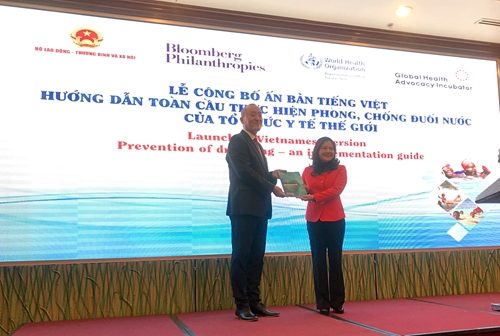This expert guidance will form the baseline of a sustainable solution to saving lives.
Every year, drowning kills more than 2,000 children in Vietnam, making it the leading cause of injury-related deaths for children in the country. Over the years, Vietnam has made great efforts in implementing child drowning prevention measures following the Prime Minister’s approval of a programme for child injury prevention for the period, 2016-2020.
This includes raising community awareness on the prevention of child drowning, teaching children swimming and water safety skills, eliminating risks of drowning at home and in communities, implementing inter-sectoral coordination of child drowning prevention activities, and encouraging active participation of communities and international organizations in this programme. In June 2018, MOLISA, WHO and GHAI, with support from Bloomberg Philanthropies, announced a new programme in the country, which aims to reduce child drowning, thus saving lives.
“We greatly appreciate the publication of this important guide. It will provide important resources for us and many other agencies and partners in Vietnam in designing and implementing effective interventions for drowning prevention in the country. It will contribute in the effective implementation of the national child injury prevention programme approved by the Prime Minister,” Mrs Nguyen Thi Ha, Vice Minister of MOLISA, remarked.
    |
 |
|
Dr Kidong Park (L) hands over the Vietnamese version of the WHO publication to Mrs Nguyen Thi Ha |
Preventing drowning: an implementation guide, published by WHO, outlines 10 evidence-based interventions and strategies to support efforts on reducing drowning incidents, one of the most preventable untended public health issues.
It proposes six interventions for child drowning prevention, including: (1) providing safe places away from water for preschool children; (2) installing barriers controlling access to water; (3) teaching school-age children swimming and water safety skills; (4) building resilience and managing flood risks and other hazards; (5) training bystanders in safe rescue and resuscitation; and (6) setting and enforcing safe boating, shipping and ferry regulations.
The guide highlights four strategies to support drowning prevention interventions, including: (1) promoting multisectoral collaboration; (2) strengthening public awareness of drowning prevention through strategic communications; (3) establishing a national water safety plan; and (4) conducting research to advance drowning prevention through data collection and well-designed studies.
“Drowning is preventable, and this guide tells us exactly how to do so. It provides us effective measures that can be implemented at various levels – from crafting relevant legislations and regulations to daily care for children. It reminds us that drowning prevention is everyone’s business, and that multiple sectors play an important role in its strengthening,” Dr Kidong Park, WHO Representative in Vietnam, called for multisectoral engagement in addressing this public health concern.
“This publication remains a mere guide if not translated to actions. This is why we commend the Government of Vietnam for taking a big step forward by already gearing up for the implementation of some of the measures outlined in this guide,” Dr Park continued. Vietnam will soon carry out relevant activities, including teaching survival swimming and water safety skills for school-age children. Providing day care service for children under 5 will also be started with the aim to ensure adult supervision to them, preventing drowning incidents.
“We are honored to support the efforts of the Government of Vietnam and the leaders in MOLISA as we work together with our partners on this vital, life-saving programme,” said Ms Marina Carter, Managing Director of GHAI. “The implementation guide released today marks an important step towards the realization of the goal we all share: reducing the number of children who lose their lives to drowning in Vietnam,” she added.
Reported by Chung Anh